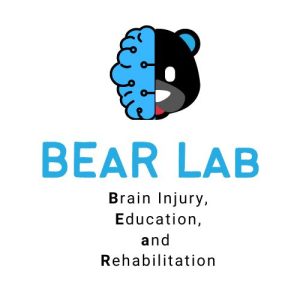Research in CSD
Students have the opportunity to work alongside researchers conducting cutting-edge research in communication sciences and disorders.
Brain injury, Education and Rehabilitation Laboratory (BEaR Lab)
The goal of the BEaR Lab, overseen by Dr. Riccardi, is to improve long-term outcomes after childhood brain injury by informing educational and rehabilitation supports and services. We are particularly interested in the domain of cognitive-communication and in populations at high-risk for experiencing a childhood brain injury. We most often approach our research from the perspective of speech-language pathology, but consistently engage with other disciplines to plan, conduct, and disseminate our research. We use behavioral, biometric (eye tracking and pupillometric), and qualitative methods to examine our research questions.

Early Language and Literacy Research Laboratory
Ongoing research exploring the relationship between language and hearing loss in early language acquisition in both typically developing children and those with communication disorders is overseen by Dr. Jane Puhlman. Recognized for her expertise in language development, students studying under Dr. Puhlman work with preschool and school-aged children in the areas of narrative development of children with hearing loss and the impact of parental modeling on children’s language development. Utilizing the LENA system, Dr. Puhlman records and analyzes communication in the child’s natural environment.
Language and Literacy Research Laboratory
The Language and Literacy Research Laboratory directed by Dr. Michelle Moore examines memory and other processes involved in language and reading, how they differ in people with communication disorders, and how knowledge of underlying mechanisms informs clinical practice.
Speech & Cognition NeuroLab
The Speech & Cognition NeuroLab is directed by Dr. Myriam Kornisch. They examine (1) speech changes after deep brain stimulation of the subthalamic nucleus in Parkinson’s disease and (2) resting-state functional connectivity associated with Parkinson’s disease, as well as (3) cerebral hemispheric differences and executive functions in monolingual/bilingual people who stutter.
Voice Laboratory
The Voice Laboratory focuses on synthetic silicone vocal fold modeling and nonlinear source-filter interactions. Overseen by Dr. Nicholas May, student researchers in the laboratory have the opportunity to develop their own research themes within the area of voice research. Dr. May is also interested in voice rehabilitation; vocology; and aerodynamic, glottographic, and acoustic measurements of speech and voice.
